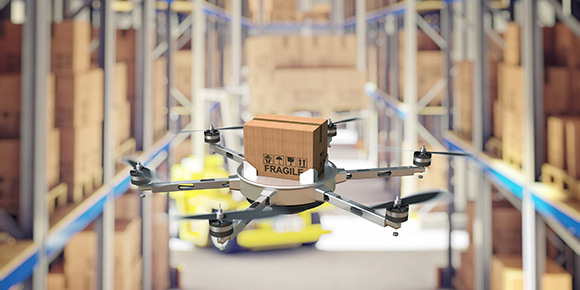The future of drone delivery
09/10/2017 00:00:00by Mark McKenna09/10/2017 00:00:00The future of drone deliveryBluedrop Services


With large companies such as Amazon and UPS already considering the use of drone delivery technology, particularly for last-mile logistics, it is a solution that forward-thinking fleet managers should be researching and contemplating. As the online shopping world becomes more and more competitive and the likes of Argos are now able to offer same day delivery, the pressure is on.
Industries already using drone technology
Drones have the ability to transform business operations in many ways and are already proving their worth in industries including farming, construction, engineering, emergency services, military, media, and of course are now starting to make waves in logistics and last-mile delivery.
Why drone delivery would help logistics
The last mile is generally found to be the most expensive part of parcel delivery and many businesses will be researching how they can possibly speed up this process at the same time as cutting costs. In fact, UPS estimated that if they cut just one mile from the 66,000 routes it’s drivers run every day they would save $50 million annually!
Efficiency of drones in fleet logistics
The use of drones in the last mile is also the best way to improve efficiencies in trucking and logistics as the full journey from warehouse to final destination would otherwise need to be travelled back and forth each time by each single drone.
The use of drone delivery could potentially save millions of pounds in labour hours, miles driven, reduced waste, and increased efficiency. Not forgetting however that with the integration of drones to your fleet there may also be alternative risks and fleet insurance considerations to address. As with the usual issues of operating a fleet of vehicles, drone fleet management will require certain measurements to be in place in terms of mitigating risk as well as other logistical, safety and regulatory considerations (such as airspace restrictions) to be aware of.
Reducing costs to inaccessible areas by road
Legalities aside, there are many benefits of adopting drones as part of your fleet. The last mile model works on the basis of a truck driving to a set location and deploying a fleet of drones to deliver the last part of the journey to a surrounding neighbourhood. Often the ‘last mile’ of delivery is the hardest and most expensive part of the process.
In many cases there will be accessibility or infrastructure issues and the last part of the delivery process often needs to be taken on foot. The use of cargo-laden drones would combat such issues and can be considered for both home delivery and supply chain delivery.
Increasing customer convenience
Drones could also have the potential to offer customers several delivery options to choose from. Drone deliveries could be more easily arranged in the evening hours when people are home, or into backyards, or even specially designed chutes for accepting package deliveries.
Inventory and building inspections can be carried out by drones
In addition to delivery benefits drones can also be used as part of the business to optimise your storage facilities. Drones can be used here to perform building inspections on warehouses which are vast spaces with hard-to-reach areas. Small, agile drones can be used to monitor areas and check inventory, this can be particularly useful in climate controlled areas. Drones can be used to quickly identify weaknesses and inefficiencies in heating and cooling systems and potentially avert possible incidents as a result.
In summary
Whilst there are still areas to iron out, such as limitations on payload, it is clear to see how the integration of drones within your fleet can improve efficiencies and profitability. Keeping an eye on developments in this area and keeping up with the competition (or keeping up with the Drones’) is something that we would advise as being essential to your business success.
Return to blog menuWant to find out more about Bluedrop's Motor Fleet Insurance?
Call our friendly team now for the right insurance cover - at the best price
+441489780491
Calls recorded for training and quality.



 Privacy and Cookie Policy
Privacy and Cookie Policy